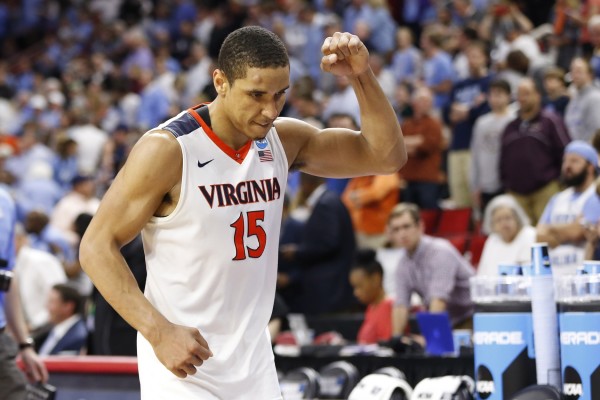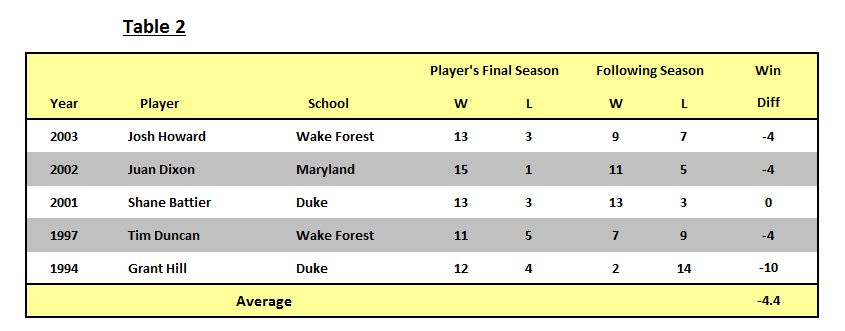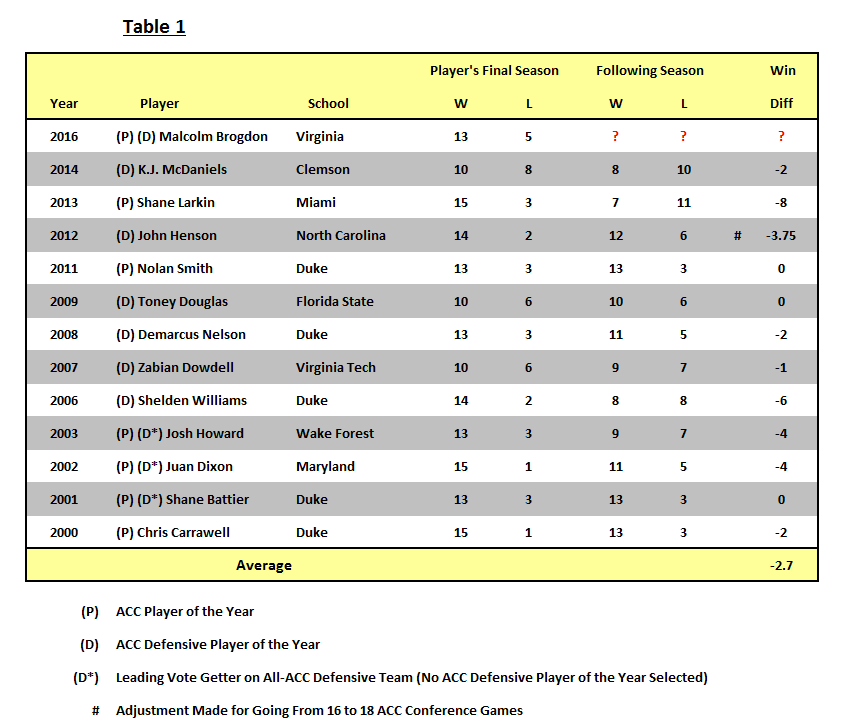The Difficulty of Replacing Malcolm Brogdon
Posted by Brad Jenkins (@bradjenk) on October 17th, 2016The last three seasons have been historically good for Virginia basketball in winning 89 games, claiming an ACC Championship, and earning two NCAA #1 seeds along the way. But for that level of excellence to continue this season, the Cavaliers have an enormous pair of shoes to fill. Four seniors departed the program, and one of those, Malcolm Brogdon, experienced one of the most decorated seasons in recent ACC history. Not only was he voted the ACC Player of the Year and the league’s top defender, the senior was also selected as a consensus All-American and the NABC National Defensive Player of the Year. Replacing a player of such high caliber on both ends of the floor will not be easy for head coach Tony Bennett, but just how hard will it turn out to be?

In 2015-16, Malcolm Brogdon became the first player to win ACC Player of the Year and ACC Defensive Player of the Year in the same season. (USA Today Images)
To gauge what Bennett is facing in replacing Brogdon, we looked at recent conference history. Since the conference began selecting an All-ACC Defensive Team after the 1999-2000 season, there have been 26 players who were on the list of top-five league defenders and also named First-Team All-ACC in the same year. Of those 26 stars, 13 were either the ACC Player of the Year and/or the league Defensive Player of the Year in that season (Table 1).
By comparing team records before and after the loss of the all-everything player, we see that a team has never improved its record afterward. Of course, none of these situations are exactly alike — talent returning or entering the program in the following season varies widely depending on the school. For instance, 2002 Duke without the services of NPOY Shane Battier started five future NBA players, including another NPOY in Jason Williams. In 2014 Miami’s Jim Larranaga not only lost Shane Larkin, but he also lost his other top five players as well. Virginia’s situation in the post-Brogdon year seems to fit somewhere in the middle of those extremes. The high quality of its newcomers may be enough to get them close to matching last season’s 13 league wins, but history appears to tell us that meeting last year’s win total is the ceiling for a team that loses such an elite all-around performer.
We decided to take this analysis a step further and examine what has happened historically (in the last 25 years) when a team must replace the best-of-the-best when it comes to all-around play. Narrowing the field of greatness to only those who, like Brogdon, were named the ACC Player of the Year while also being considered the league’s top defender reveals the following (Table 2).

The ACC did not name a Defensive POY until 2005, but since Wake Forest’s Josh Howard, Maryland’s Juan Dixon and Duke’s Battier were the leading vote-getters on the All-ACC Defensive Team during those years, we will grant them that honor ex post facto. Duncan and Hill played in an era before the league named an All-ACC Defensive team, but there’s absolutely no doubt that each player was regarded as the best defender in the conference — both all-time greats, also like Brogdon, were awarded the NABC’s National Defensive Player of the Year award. Nobody would consider Brogdon at the level of Duncan or Hill, but the 1990s were a different era in college basketball when great players stayed around school considerably longer. That said, it seems reasonable to compare Brogdon with the three more recent ACC stars. There are two extreme cases shown in Table 2. The loaded 2002 Duke team didn’t slip in the standings at all, while 1995 Duke suffered the loss of head coach Mike Krzyzewski for the majority of the season with serious back issues. But make no mistake — the loss of Grant Hill from the lineup was probably a bigger factor in Duke’s 2-14 ACC collapse than was the absence of Coach K.
In reality, all this data merely confirms what we already know — it’s really hard to replace a great all-around player and Virginia is likely to slip a notch or more because of it. What we don’t know is whether the Cavaliers will miss Brogdon more on the offensive or defensive end. Given Bennett’s patient offensive style, Brogdon was the one play-maker who could make something happen late in the shot clock. Who does that for Virginia this year? On the other end of the floor, Brogdon’s ability to shut down the opponents’ hot-handed perimeter players (guards and forwards alike) made life much easier for the rest of the team’s defenders. Our best guess: With the makeup of this Virginia squad, year one of the post-Brogdon era will still be a successful one defensively, but look for Bennett’s group to be less efficient on the offensive end and therefore drop one or two more league games than a year ago.











































